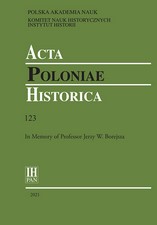“AN UNFULFILLED WRITER WHO BECAME A HISTORIAN”. JERZY WOJCIECH BOREJSZA (22 AUGUST 1935 – 28 JULY 2019)
“AN UNFULFILLED WRITER WHO BECAME A HISTORIAN”. JERZY WOJCIECH BOREJSZA (22 AUGUST 1935 – 28 JULY 2019)
Author(s): Mariusz WołosContributor(s): Tristan Korecki (Translator)
Subject(s): Political history, 19th Century, History of Communism
Published by: Instytut Historii im. Tadeusza Manteuffla Polskiej Akademii Nauk
Keywords: Jerzy Wojciech Borejsza; Polish historiography; history of the nineteenth century; totalitarian and authoritarian regimes in Europe;
Summary/Abstract: Jerzy Wojciech Borejsza was the son of communist activist Jerzy Borejsza, referred to as an ‘international communist’, and Ewa née Kantor. His grandfather Abraham Goldberg was one of the leaders of Polish Zionists. Borejsza described himself as ‘a Pole of Jewish origin’. His personality was greatly influenced by the Second World War experiences, including the pogrom of Jews in German-occupied Lwów in July 1941 and the tragic events of occupied Warsaw. As a result of the decision of the communist party authorities, in 1952, Borejsza was sent to study in the Soviet Union, first to Kazan, then to Moscow. This made it impossible for him to study Polish philology in Warsaw; Borejsza, therefore, chose historical studies. After returning to Poland in 1957, he undertook research on the history of Polish emigration after the January Uprising (1863–4). He was also interested in the history of the Polish socialist movement and its connections to socialism in Western Europe. Later, Borejsza intervened in the historiography of the Crimean War (1853–6), intending to bring this forgotten armed conflict back to light. He coined the phrase ‘the beautiful nineteenth century’, in contrast to the twentieth century as a time of hatred, extermination, and the Holocaust. Initially, Borejsza worked at the Polish Academy of Sciences (1958–64), then at the University of Warsaw (1964–75). In the early 1970s, he began research on Italian fascism and Italy’s unsuccessful attempts to create a fascist International.
Journal: Acta Poloniae Historica
- Issue Year: 2021
- Issue No: 123
- Page Range: 7-56
- Page Count: 50
- Language: English

